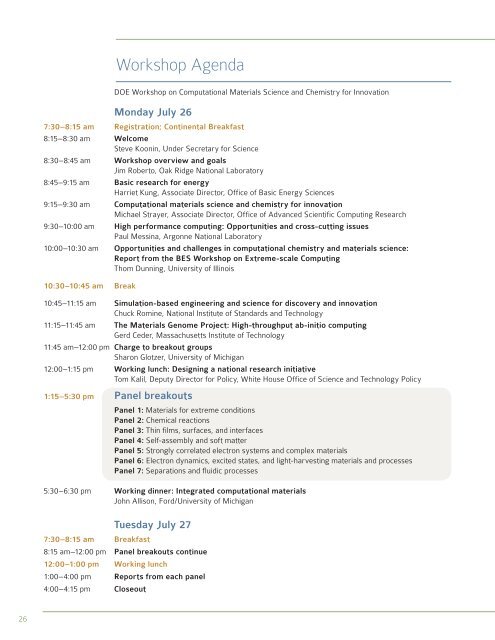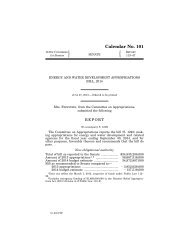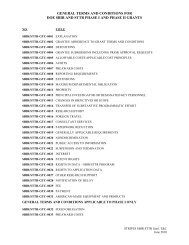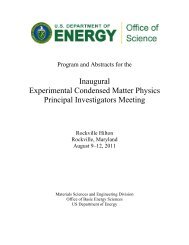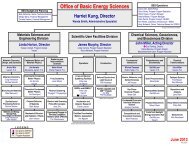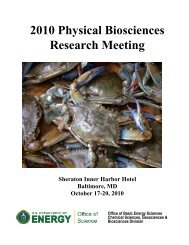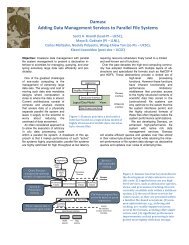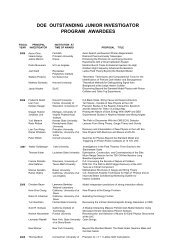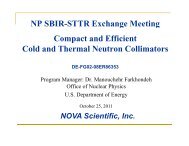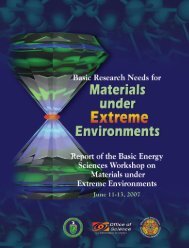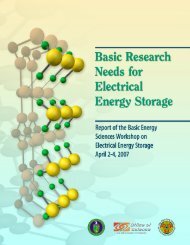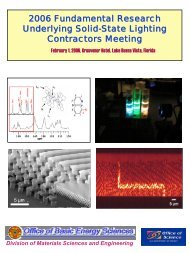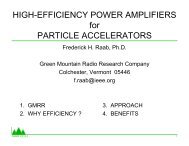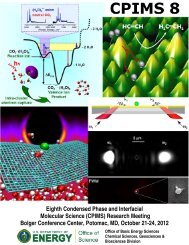Computational Materials Science and Chemistry ... - Office of Science
Computational Materials Science and Chemistry ... - Office of Science
Computational Materials Science and Chemistry ... - Office of Science
Create successful ePaper yourself
Turn your PDF publications into a flip-book with our unique Google optimized e-Paper software.
26<br />
Workshop Agenda<br />
DOE Workshop on <strong>Computational</strong> <strong>Materials</strong> <strong>Science</strong> <strong>and</strong> <strong>Chemistry</strong> for Innovation<br />
Monday July 26<br />
7:30–8:15 am Registration; Continental Breakfast<br />
8:15–8:30 am Welcome<br />
Steve Koonin, Under Secretary for <strong>Science</strong><br />
8:30–8:45 am Workshop overview <strong>and</strong> goals<br />
Jim Roberto, Oak Ridge National Laboratory<br />
8:45–9:15 am Basic research for energy<br />
Harriet Kung, Associate Director, <strong>Office</strong> <strong>of</strong> Basic Energy <strong>Science</strong>s<br />
9:15–9:30 am <strong>Computational</strong> materials science <strong>and</strong> chemistry for innovation<br />
Michael Strayer, Associate Director, <strong>Office</strong> <strong>of</strong> Advanced Scientific Computing Research<br />
9:30–10:00 am High performance computing: Opportunities <strong>and</strong> cross-cutting issues<br />
Paul Messina, Argonne National Laboratory<br />
10:00–10:30 am Opportunities <strong>and</strong> challenges in computational chemistry <strong>and</strong> materials science:<br />
Report from the BES Workshop on Extreme-scale Computing<br />
Thom Dunning, University <strong>of</strong> Illinois<br />
10:30–10:45 am Break<br />
10:45–11:15 am Simulation-based engineering <strong>and</strong> science for discovery <strong>and</strong> innovation<br />
Chuck Romine, National Institute <strong>of</strong> St<strong>and</strong>ards <strong>and</strong> Technology<br />
11:15–11:45 am The <strong>Materials</strong> Genome Project: High-throughput ab-initio computing<br />
Gerd Ceder, Massachusetts Institute <strong>of</strong> Technology<br />
11:45 am–12:00 pm Charge to breakout groups<br />
Sharon Glotzer, University <strong>of</strong> Michigan<br />
12:00–1:15 pm Working lunch: Designing a national research initiative<br />
Tom Kalil, Deputy Director for Policy, White House <strong>Office</strong> <strong>of</strong> <strong>Science</strong> <strong>and</strong> Technology Policy<br />
1:15–5:30 pm Panel breakouts<br />
Panel 1: <strong>Materials</strong> for extreme conditions<br />
Panel 2: Chemical reactions<br />
Panel 3: Thin films, surfaces, <strong>and</strong> interfaces<br />
Panel 4: Self-assembly <strong>and</strong> s<strong>of</strong>t matter<br />
Panel 5: Strongly correlated electron systems <strong>and</strong> complex materials<br />
Panel 6: Electron dynamics, excited states, <strong>and</strong> light-harvesting materials <strong>and</strong> processes<br />
Panel 7: Separations <strong>and</strong> fluidic processes<br />
5:30–6:30 pm Working dinner: Integrated computational materials<br />
John Allison, Ford/University <strong>of</strong> Michigan<br />
7:30–8:15 am Breakfast<br />
Tuesday July 27<br />
8:15 am–12:00 pm Panel breakouts continue<br />
12:00–1:00 pm Working lunch<br />
1:00–4:00 pm Reports from each panel<br />
4:00–4:15 pm Closeout


